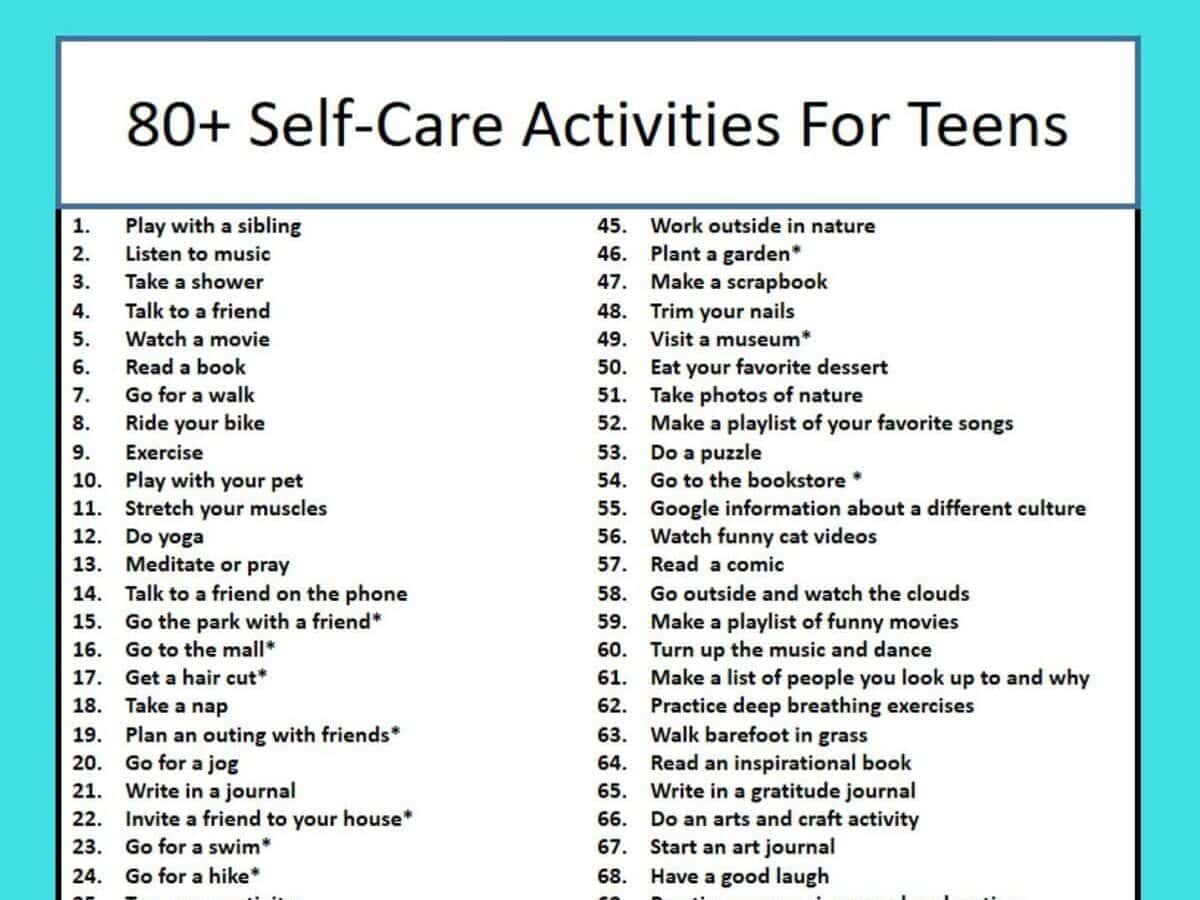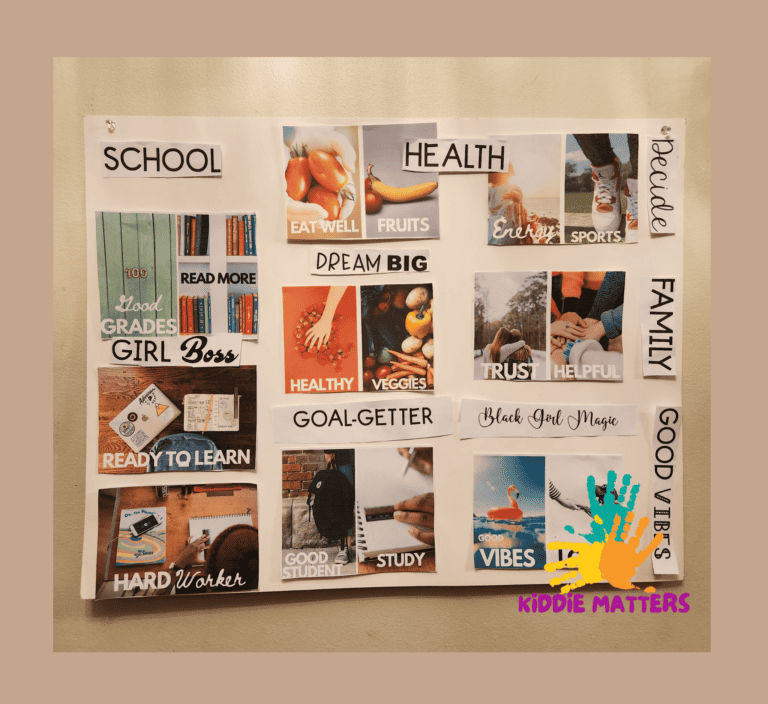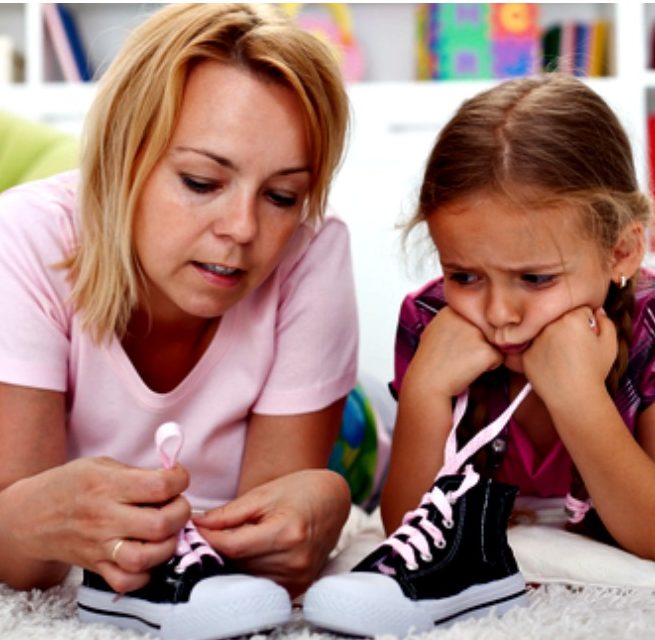80+ Self-Care Activities for Teens
It’s the end of the day and I just met with my last student. My shoulders tighten up as the day’s events play out in my head. The concerned teacher, worried about bruises she saw on one of her students. The panic-stricken mom, desperate to get in to see a therapist for her son who struggles with depression. The “angry” kid, sobbing because his dad lost his job and yells at him constantly.
Being a teen comes with many highs and lows. Even though they have the promise of a future ahead of them, right now they’re drowning under the immense pressures of adolescence. They’re figuring out dating, friendships, school work, college applications, and what careers they want to pursue.
But that’s not even the half of it. Studies show that today’s teens are faced with higher levels of stress as they navigate academic pressures, social expectations, and the ever-growing influence of technology on their lives. On top of that, the lingering effects of the COVID-19 pandemic and fears around school shootings, continue to negatively impact teen’s mental health. It comes as no surprise that suicide is now the second leading cause of death among teens
As I sat there doom scrolling my thoughts, I felt helpless. The needs of my students were great and there was only one of me. Between managing crises, completing administrative tasks, and making due with limited resources, how could I make a meaningful difference in my students’ lives?
Teenagers need to know that they deserve better. They deserve peace of mind and safety when they’re at school learning. They deserve validation and compassion as they navigate unprecedented challenges. They deserve support and guidance so they don’t have to go it alone.
Bonus: As a bonus for joining my weekly newsletter, get a free cheat sheet of 85 Self-Care activities for teens and a self-care planner to help teens create a self-care plan.
- But Here’s The Problem
- So What Can You Do?
- The Importance of Self-Care for Teens
- Myths About Self-Care
- Building Resilience with Self Care Activities
- 80+ Self-Care Activities for Teens
- How To Create a Self-Care Plan That Sticks
- Get Your Free Cheat Sheet: 80+ Self Care Activities for Teens
- Here’s A Sneak Peek of Your Printable Cheat Sheet:
- Before you go, get my FREE cheat sheet: 85 Self-Care Activities for Teens
- Your Turn
But Here’s The Problem
It’s heartbreaking to think about children calling shelters home, worrying they’ll be gunned down in math class, or choosing to take their own lives because they saw no other way out of the pain they felt.
However, despite the current surge in the number of teens grappling with emotional problems, a significant barrier to treatment exists. The current system often prioritizes kids in acute crisis or with diagnosed mental health conditions. This leaves a substantial gap for teens experiencing emotional challenges that may not meet the criteria for immediate intervention.
Many are looking to school social workers and counselors to fill the gap. But when you spend most of your time putting out fires and being a jack of all trades, you’re perpetually in crisis mode, not solution focused mode. All your plans to help build kids’ mental and emotional resilience might as well be written in sand. Because the moment a crisis pops up, all those plans go out the window. You simply don’t have the bandwidth to take lead on the current mental health crisis teens are experiencing.
So What Can You Do?
As the number of adolescents facing emotional challenges continue to rise, it becomes imperative to explore holistic approaches that supplement traditional mental health interventions. To be clear, this is NOT about finding a replacement for mental health services. The aim here is to find ways to help kids cope while they wait for services to become available.
The solution…self-care activities for teens.Teens have very little control over the stressors in their lives, which can heighten their fears and anxiety. Teaching them self-care skills allows them to lean into the thing they do have control over, their response to the situation. Empowering teens with self-care skills isn’t just a way to prevent issues, but also a proactive step in supporting kids who often fall through the cracks.
The Importance of Self-Care for Teens
health. By instilling self-care habits early on, kids learn to manage stress, build resilience, and prioritize their mental and emotional health. It helps them develop a strong sense of self-awareness and fosters a positive relationship with their own bodies and minds. Additionally, practicing self-care promotes healthy habits that can extend into adulthood.
When armed with effective self-care practices, adolescents are better equipped to handle the ups and downs of life, which reduces the likelihood of emotional struggles escalating into more serious mental health issues. Ultimately, teaching kids to care for themselves empowers them to navigate life’s challenges with a foundation of self-love and a balanced approach to their physical and mental health needs.
Myths About Self-Care
- Self-care is selfish: One common myth is that taking time for self-care is selfish. In reality, self-care is essential for maintaining mental, emotional, and physical well-being, enabling individuals to better care for others.
- Self-care requires a lot of time: Another misconception is that effective self-care demands a significant amount of time. In truth, even small, consistent practices, such as short breaks, mindful moments, or brief exercises, can have a positive impact.
- Self-care is only about pampering: Some believe that self-care is solely about indulgent activities like spa days or vacations. While those can be forms of self-care, it also includes practical aspects like setting boundaries, saying no, and prioritizing rest.
- Self-care is a one-size-fits-all concept: Self-care is individualized, and what works for one person might not work for another. It’s a personal journey of discovering activities and practices that resonate with an individual’s unique needs and preferences.
- Self-care is expensive: Contrary to the belief that self-care requires a substantial financial investment, many self-care practices are accessible and budget-friendly. Simple activities like walking, journaling, or practicing gratitude can be powerful forms of self-care.
- Self-care is a luxury: Some perceive self-care as a luxury reserved for those with ample free time. In reality, integrating self-care into daily life is about priorities and recognizing the importance of well-being amid the demands of a busy schedule.
The truth is, self-care isn’t always about going to the spa or buying yourself something nice. It’s about checking in with yourself. Teenagers need breaks to recharge their physical and emotional batteries. Their mental health depends on it.
Building Resilience with Self Care Activities
Self-care activities are essential practices that nurture overall well-being. Incorporating self-care activities into teenagers’ routines allow them to make self-care a consistent part of their lives. Additionally, encouraging teens to prioritize their well-being through self-care activities cultivates resilience and provides essential tools for overcoming life’s obstacles.
Self-care is typically seen as indulging in spa treatments and candlelit bubble baths. However, self-care is any activity you engage in that nurtures your physical and mental health. For teens, self-care involves intentionally engaging in activities that promote relaxation, stress management, and personal growth. This can include practices such as regular exercise, sufficient sleep, mindfulness exercises, and pursuing hobbies or creative outlets. Here are a list of self-care activities tailored for teens:
80+ Self-Care Activities for Teens
- Listen to music
- Take a shower
- Talk to a friend
- Watch a movie
- Read a book
- Go for a walk
- Ride your bike
- Exercise
- Play with your pet
- Stretch your muscles
- Do yoga
- Meditate or pray
- Talk to a friend on the phone
- Go the park with a friend*
- Go to the mall*
- Get a hair cut*
- Take a nap
- Plan an outing with friends*
- Go for a jog
- Write in a journal
- Invite a friend to your house*
- Go for a swim*
- Go for a hike*
- Try a new activity
- Play board games
- Play card games
- Play a video game
- Cook with your parent
- Go to the spa with a parent
- Go outside and watch the birds and other animals
- Make a list of things you like about you
- Go to the library
- Write a poem/short story
- Learn a new language
- Sing your favorite songs
- Write a song
- Learn to play an instrument
- Make a funny video
- Draw or paint a picture
- Make a list of your accomplishments
- Make a bucket list
- Write a letter to your future self
- Make a list of things you’re good at
- Work outside in nature
- Plant a garden*
- Make a scrapbook
- Trim your nails
- Visit a museum*
- Eat your favorite dessert
- Take photos of nature
- Make a playlist of your favorite songs
- Do a puzzle
- Play with a sibling
- Go to the bookstore *
- Google information about a different culture
- Watch funny cat videos
- Read a comic
- Go outside and watch the clouds
- Make a playlist of funny movies
- Turn up the music and dance
- Make a list of people you look up to and why
- Practice deep breathing exercises
- Walk barefoot in grass
- Read an inspirational book
- Write in a gratitude journal
- Do an arts and craft activity
- Start an art journal
- Have a good laugh
- Practice progressive muscle relaxation
- Volunteer in your community*
- Draw or color Zentangles
- Draw or color Mandalas
- Unplug and spend time in nature
- Go stargazing
- Make a fairy garden
- Look at family photo albums
- Read inspiring quotes
- Listen to running water
- Snuggle under a cozy blanket
- Fly a kite
- Write a love letter to yourself
- Make jewelry
- Blow bubbles and be silly
- Give yourself a self-massage
- Daydream
*ASK FOR PARENT PERMISSION
How To Create a Self-Care Plan That Sticks
A self-care plan is a set of daily activities we deliberately take part in to improve our overall well-being. Everyone has their own physical and emotional needs and self-care plans will differ. Strategies that work for one teen might not work for another. The right self-care plan is the one that meets the teen’s individual needs. Here are five tips to create a powerful self-care plan with teens:
- 1. Identify Individual Needs: Tailor the self-care plan to the specific needs and interests of the teen. Consider factors such as hobbies, stress triggers, and preferences to make the plan more effective.
2. Balance Activities: Include a mix of activities that cater to different aspects of well-being, such as physical, emotional, and social. Balancing screen time, physical exercise, creative outlets, and social interactions can contribute to a holistic self-care routine.
3. Establish Consistent Routines: Help teens create consistent self-care habits by incorporating activities into their daily or weekly routines. Consistency is key for long-term well-being and stress management.
4. Encourage Open Communication: Foster an environment where teens feel comfortable expressing their feelings and needs. Encourage open communication with trusted individuals, whether it’s friends, family, or mental health professionals.
5. Set Realistic Goals: Help teens set achievable and realistic self-care goals. Breaking down larger objectives into smaller, manageable steps can make self-care more accessible and empower teens to track their progress.
Get Your Free Cheat Sheet: 80+ Self Care Activities for Teens
Use this cheat sheet of self-care activities to create a self-care plan with teens that helps them manage stress, regulate emotions, and focus on their needs. Best part, you can do this with teens even when you’re too busy.
- Get the free cheat sheet. Join my weekly newsletter and as a bonus, you’ll get the printable! Just click here to get it and subscribe.
- Print. Any paper will work, but card stock would be ideal.
- Hang your cheat sheet. Place your cheat sheet somewhere visible, like on a bulletin board. Print a copy for students too and they can put it on their refrigerator at home.
- Explore self-care activities: Meet with students to discuss their physical and emotional needs and create a self-care plan. (See the How to Create a Self-Care Plan That Sticks section for tips on creating a self-care plan). If you have more than 10 minutes to spare, here are some additional ways this cheat sheet can be used:
- Form a self-care psycho-educational group to discuss self-care and different self-care activities teens can practice.
- Collaborate with teachers to do an in-class lesson on stress management and self-care. This is a great one to do with Health and Physical Education teachers.
- Host a workshop for parents that focuses on stress management and self-care for teens.
Here’s A Sneak Peek of Your Printable Cheat Sheet:
Before you go, get my FREE cheat sheet: 85 Self-Care Activities for Teens
Your Turn
What are your favorite self-care activities for teens? Share in a comment below!










I am a licensed therapist and I just happened to come up this page. Awesome list of self care activities. I run a social skills groups for teens and this information is very helpful.
I run childrens and teens yoga classes and came across this! What fab ideas! Very inspiring! Will be sharing with my social media 😍